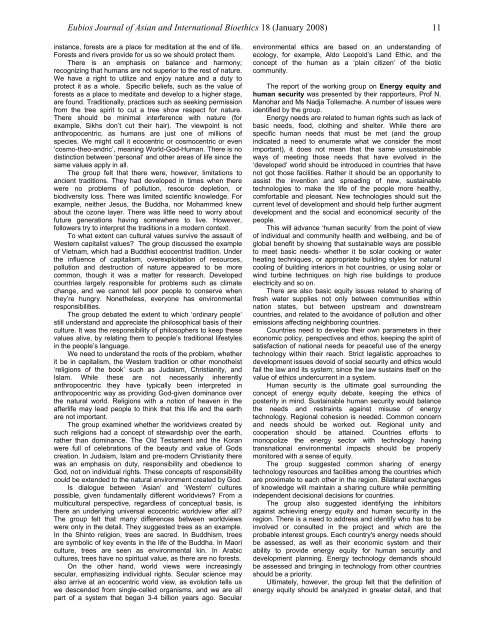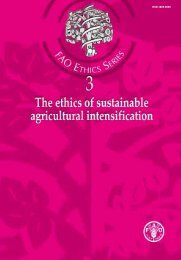Eubios Journal of Asian and International Bioethics EJAIB
Eubios Journal of Asian and International Bioethics EJAIB
Eubios Journal of Asian and International Bioethics EJAIB
- No tags were found...
Create successful ePaper yourself
Turn your PDF publications into a flip-book with our unique Google optimized e-Paper software.
<strong>Eubios</strong> <strong>Journal</strong> <strong>of</strong> <strong>Asian</strong> <strong>and</strong> <strong>International</strong> <strong>Bioethics</strong> 18 (January 2008) 11instance, forests are a place for meditation at the end <strong>of</strong> life.Forests <strong>and</strong> rivers provide for us so we should protect them.There is an emphasis on balance <strong>and</strong> harmony;recognizing that humans are not superior to the rest <strong>of</strong> nature.We have a right to utilize <strong>and</strong> enjoy nature <strong>and</strong> a duty toprotect it as a whole. Specific beliefs, such as the value <strong>of</strong>forests as a place to meditate <strong>and</strong> develop to a higher stage,are found. Traditionally, practices such as seeking permissionfrom the tree spirit to cut a tree show respect for nature.There should be minimal interference with nature (forexample, Sikhs don’t cut their hair). The viewpoint is notanthropocentric, as humans are just one <strong>of</strong> millions <strong>of</strong>species. We might call it ecocentric or cosmocentric or even‘cosmo-theo-<strong>and</strong>ric’, meaning World-God-Human. There is nodistinction between ‘personal’ <strong>and</strong> other areas <strong>of</strong> life since thesame values apply in all.The group felt that there were, however, limitations toancient traditions. They had developed in times when therewere no problems <strong>of</strong> pollution, resource depletion, orbiodiversity loss. There was limited scientific knowledge. Forexample, neither Jesus, the Buddha, nor Mohammed knewabout the ozone layer. There was little need to worry aboutfuture generations having somewhere to live. However,followers try to interpret the traditions in a modern context.To what extent can cultural values survive the assault <strong>of</strong>Western capitalist values? The group discussed the example<strong>of</strong> Vietnam, which had a Buddhist ecocentrist tradition. Underthe influence <strong>of</strong> capitalism, overexploitation <strong>of</strong> resources,pollution <strong>and</strong> destruction <strong>of</strong> nature appeared to be morecommon, though it was a matter for research. Developedcountries largely responsible for problems such as climatechange, <strong>and</strong> we cannot tell poor people to conserve whenthey’re hungry. Nonetheless, everyone has environmentalresponsibilities.The group debated the extent to which ‘ordinary people’still underst<strong>and</strong> <strong>and</strong> appreciate the philosophical basis <strong>of</strong> theirculture. It was the responsibility <strong>of</strong> philosophers to keep thesevalues alive, by relating them to people’s traditional lifestylesin the people’s language.We need to underst<strong>and</strong> the roots <strong>of</strong> the problem, whetherit be in capitalism, the Western tradition or other monotheist‘religions <strong>of</strong> the book’ such as Judaism, Christianity, <strong>and</strong>Islam. While these are not necessarily inherentlyanthropocentric they have typically been interpreted inanthropocentric way as providing God-given dominance overthe natural world. Religions with a notion <strong>of</strong> heaven in theafterlife may lead people to think that this life <strong>and</strong> the earthare not important.The group examined whether the worldviews created bysuch religions had a concept <strong>of</strong> stewardship over the earth,rather than dominance. The Old Testament <strong>and</strong> the Koranwere full <strong>of</strong> celebrations <strong>of</strong> the beauty <strong>and</strong> value <strong>of</strong> Godscreation. In Judaism, Islam <strong>and</strong> pre-modern Christianity therewas an emphasis on duty, responsibility <strong>and</strong> obedience toGod, not on individual rights. These concepts <strong>of</strong> responsibilitycould be extended to the natural environment created by God.Is dialogue between ‘<strong>Asian</strong>’ <strong>and</strong> ‘Western’ culturespossible, given fundamentally different worldviews? From amulticultural perspective, regardless <strong>of</strong> conceptual basis, isthere an underlying universal ecocentric worldview after all?The group felt that many differences between worldviewswere only in the detail. They suggested trees as an example.In the Shinto religion, trees are sacred. In Buddhism, treesare symbolic <strong>of</strong> key events in the life <strong>of</strong> the Buddha. In Maoriculture, trees are seen as environmental kin. In Arabiccultures, trees have no spiritual value, as there are no forests.On the other h<strong>and</strong>, world views were increasinglysecular, emphasizing individual rights. Secular science mayalso arrive at an ecocentric world view, as evolution tells uswe descended from single-celled organisms, <strong>and</strong> we are allpart <strong>of</strong> a system that began 3-4 billion years ago. Secularenvironmental ethics are based on an underst<strong>and</strong>ing <strong>of</strong>ecology, for example, Aldo Leopold’s L<strong>and</strong> Ethic, <strong>and</strong> theconcept <strong>of</strong> the human as a ‘plain citizen’ <strong>of</strong> the bioticcommunity.The report <strong>of</strong> the working group on Energy equity <strong>and</strong>human security was presented by their rapporteurs, Pr<strong>of</strong> N.Manohar <strong>and</strong> Ms Nadja Tollemache. A number <strong>of</strong> issues wereidentified by the group.Energy needs are related to human rights such as lack <strong>of</strong>basic needs, food, clothing <strong>and</strong> shelter. While there arespecific human needs that must be met (<strong>and</strong> the groupindicated a need to enumerate what we consider the mostimportant), it does not mean that the same unsustainableways <strong>of</strong> meeting those needs that have evolved in the‘developed’ world should be introduced in countries that havenot got those facilities. Rather it should be an opportunity toassist the invention <strong>and</strong> spreading <strong>of</strong> new, sustainabletechnologies to make the life <strong>of</strong> the people more healthy,comfortable <strong>and</strong> pleasant. New technologies should suit thecurrent level <strong>of</strong> development <strong>and</strong> should help further augmentdevelopment <strong>and</strong> the social <strong>and</strong> economical security <strong>of</strong> thepeople.This will advance ‘human security’ from the point <strong>of</strong> view<strong>of</strong> individual <strong>and</strong> community health <strong>and</strong> wellbeing, <strong>and</strong> be <strong>of</strong>global benefit by showing that sustainable ways are possibleto meet basic needs- whether it be solar cooking or waterheating techniques, or appropriate building styles for naturalcooling <strong>of</strong> building interiors in hot countries, or using solar orwind turbine techniques on high rise buildings to produceelectricity <strong>and</strong> so on.There are also basic equity issues related to sharing <strong>of</strong>fresh water supplies not only between communities withinnation states, but between upstream <strong>and</strong> downstreamcountries, <strong>and</strong> related to the avoidance <strong>of</strong> pollution <strong>and</strong> otheremissions affecting neighboring countries.Countries need to develop their own parameters in theireconomic policy, perspectives <strong>and</strong> ethos, keeping the spirit <strong>of</strong>satisfaction <strong>of</strong> national needs for peaceful use <strong>of</strong> the energytechnology within their reach. Strict legalistic approaches todevelopment issues devoid <strong>of</strong> social security <strong>and</strong> ethics wouldfail the law <strong>and</strong> its system; since the law sustains itself on thevalue <strong>of</strong> ethics undercurrent in a system.Human security is the ultimate goal surrounding theconcept <strong>of</strong> energy equity debate, keeping the ethics <strong>of</strong>posterity in mind. Sustainable human security would balancethe needs <strong>and</strong> restraints against misuse <strong>of</strong> energytechnology. Regional cohesion is needed. Common concern<strong>and</strong> needs should be worked out. Regional unity <strong>and</strong>cooperation should be attained. Countries efforts tomonopolize the energy sector with technology havingtransnational environmental impacts should be properlymonitored with a sense <strong>of</strong> equity.The group suggested common sharing <strong>of</strong> energytechnology resources <strong>and</strong> facilities among the countries whichare proximate to each other in the region. Bilateral exchanges<strong>of</strong> knowledge will maintain a sharing culture while permittingindependent decisional decisions for countries.The group also suggested identifying the inhibitorsagainst achieving energy equity <strong>and</strong> human security in theregion. There is a need to address <strong>and</strong> identify who has to beinvolved or consulted in the project <strong>and</strong> which are theprobable interest groups. Each country's energy needs shouldbe assessed, as well as their economic system <strong>and</strong> theirability to provide energy equity for human security <strong>and</strong>development planning. Energy technology dem<strong>and</strong>s shouldbe assessed <strong>and</strong> bringing in technology from other countriesshould be a priority.Ultimately, however, the group felt that the definition <strong>of</strong>energy equity should be analyzed in greater detail, <strong>and</strong> that
















